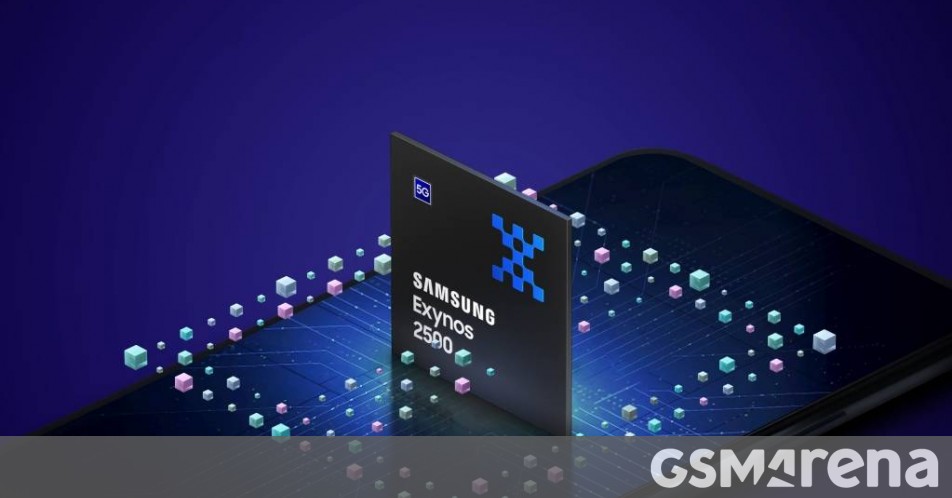Exynos 2500 unveiled: 3nm GAA, Cortex-X925, bigger GPU and satellite messaging support
The Exynos 2500 was not ready in time for the Galaxy S25 series, but Samsung has put the finishing touches on it and made it official – just in time for the Galaxy Z Flip7, which will debut on July 9.
The Exynos 2500 is fabbed on Samsung’s latest 3nm Gate All Around (GAA) node for improved power efficiency and uses new packaging – Fan-Out Wafer-Level Packaging or FOWLP. This allows for a reduced chip thickness and improved heat dissipation.
The CPU is a 10-core (deca-core) design with what Samsung calls a 1+7+2 arrangement. In reality, it is 1+2+5+2 as the mid-cores are split into two to reduce power consumption. Samsung is claiming a 15% higher “big-core” performance.

The CPU features one Cortex-X925 core running at 3.3GHz, two fast Cortex-A725 at 2.74GHz and five more A725 at 2.36GHz, plus a pair of Cortex-A520 cores at 1.8GHz. You can see a detailed breakdown in the table below, plus a comparison with the old Exynos 2400 and the Dimensity 9400 (non-plus).
| Exynos 2400 | Exynos 2500 | Dimensity 9400 | |
|---|---|---|---|
| Node | Samsung 4nm 4LPP+ | Samsung 3nm GAA | TSMC 3nm N3E |
| CPU Prime | 1x Cortex-X4 @ 3.2GHz | 1x Cortex-X925 @ 3.3GHz | 1x Cortex-X925 @ 3.62GHz |
| CPU Big 1 | 2x Cortex-A720 @ 2.9GHz | 2x Cortex-A720 @ 2.74GHz | 3x Cortex-X4 @ 3.3GHz |
| CPU Big 2 | 5x Cortex-A720 @ 2.6GHz | 5x Cortex-A720 @ 2.36GHz | 4x Cortex-A620 @ 2.4GHz |
| CPU Small | 2x Cortex-A520 @ 1.95GHz | 2x Cortex-A520 @ 1.8GHz | – |
| GPU | Xclipse 940 (RDNA 3) | Xclipse 950 (RDNA 3) | Immortalis-G925 |
| GPU spec | 6 WGP, 4 RB | 8 WGP, 8 RB | MC12 |
| NPU | 17K MAC | 24K MAC, 59 TOPS | MT NPU 890 |
| Storage | UFS 4.0 | UFS 4.0 | UFS 4.0 |
| 5G | Rel. 17 9.6Gbps FR1 12.1Gbps FR2 |
Rel. 17 9.6Gbps FR1 12.1Gbps FR2 NTN |
Rel. 17 |
| Connectivity | Wi-Fi 6E, Bluetooth 5.3 | Wi-Fi 7, Bluetooth 5.4 | Wi-Fi 7, Bluetooth 6 |
| Camera | 320MP, 8K @ 30fps | 320MP, 8K @ 30fps | 320MP, 8K @ 30fps |
The GPU is an Xclipse 950, the fourth generation of AMD-based graphics. These are based on RDNA 3 (like on the previous chipset) and support hardware-accelerated ray tracing. While it’s based on the same architecture, the Xclipse 950 is a bigger GPU with 8 work group processors (WGP) and 8 render backends (RB, these contain the ROPs). For comparison, the Exynos 2400 GPU had 6 work group processors and 4 render backends. This should deliver 28% higher FPS in ray tracing-enabled games.
The latest chipset also brings a significant speedup to the NPU – AI tasks can leverage up to 59 TOPS, 39% more than the Exynos 2400 had to offer. This should enable more features to work on device. In terms of hardware, Samsung built a design with two 12K MAC clusters (for a total of 24K MAC), up from the 17K MAC of the old chip.

Samsung beefed up the camera hardware as well – the Exynos 2500 supports AI-based image processing for sensors up to 320MP. Photos can be shot with multi-layer noise reduction and Dynamic Range Compression (DRC). The video block can record at 8K resolution at up to 30 fps. Video playback goes up to 8K 60fps and features AV1 decoding.
A key upgrade to the built-in Exynos modem is support for non-terrestrial network (NTN) capabilities – this opens the door for satellite-based messaging. The 5G modem supports the latest 3GPP Rel. 17 and offers up to 9.6Gbps speeds for FR1 and up to 12.1Gbps for FR2. Local connectivity includes Wi-Fi 7 and Bluetooth 5.4. Samsung also says that it has improved the analog GNSS interface (for global positioning).

The official Exynos 2500 page reads “Product status: mass production”. Samsung should have enough units for the new Galaxy Z Flip7. The cheaper Z Flip7 FE might use the older Exynos 2400.
Source
